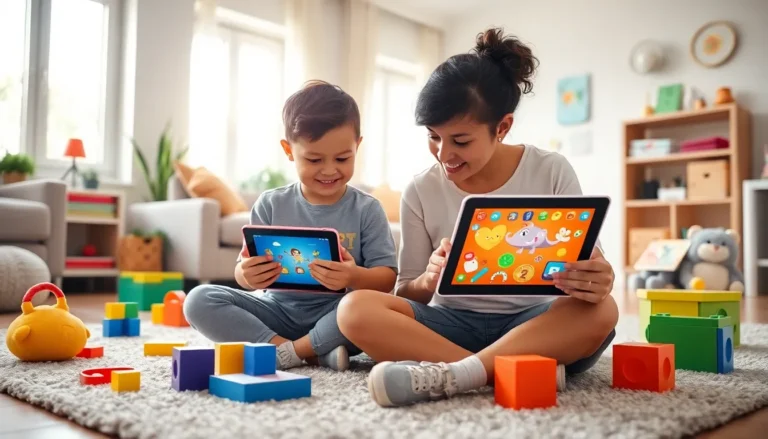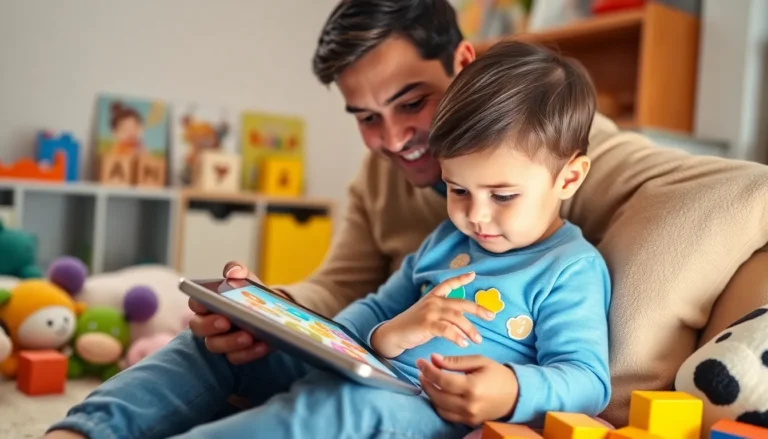When it comes to baby hygiene, parents often find themselves in a whirlwind of wipes, baths, and the occasional diaper disaster. Keeping a tiny human clean can feel like a full-time job, but it doesn’t have to be a comedy of errors. With the right tips and tricks, maintaining baby hygiene can be a breeze—and even a little fun!
Table of Contents
ToggleUnderstanding Baby Hygiene
Maintaining baby hygiene plays a crucial role in ensuring optimal health and comfort for infants. Parents often encounter various challenges, but understanding effective practices can make hygiene manageable.
Importance of Baby Hygiene
Baby hygiene prevents infections and promotes overall well-being. Keeping a baby clean reduces the risk of skin irritations and rashes. Regular cleanliness fosters a healthier environment that supports growth and development. Understanding these benefits empowers parents to prioritize hygiene routines. Good practices build a foundational sense of comfort and freshness for babies, leading to improved sleep patterns and happier moods.
Common Baby Hygiene Practices
Several key practices ensure infants remain clean. Frequent diaper changes, ideally every two to three hours, maintain skin health. Regular baths, two to three times a week, help wash away dirt and irritants. Using gentle soaps and shampoos designed for babies minimizes the risk of allergic reactions. Cleaning hands after diaper changes and before feeding is essential to prevent the spread of germs. Incorporating these practices into a daily routine simplifies the process and enhances both baby care and parental confidence.
Bathing Your Baby

Bathing is an essential part of maintaining baby hygiene. It ensures cleanliness while making bath time a bonding experience for parents and their infants.
Recommended Bathing Frequency
Parents often bathe infants two to three times a week. Bathing more frequently can lead to dry skin, as newborns don’t get very dirty. It’s advisable to use a damp washcloth for cleaning during daily diaper changes instead. Bathing before bedtime can promote better sleep patterns. Always observe your baby’s skin type, adjusting the frequency if dryness develops. Regular baths support skin health and hygienic practices that contribute to overall well-being.
Tips for a Safe Bathing Experience
Safety should be a priority during bath time. Always prepare all items needed, such as soap, towels, and washcloths, within reach before starting the bath. Use a flat surface, like a tub or sink, to prevent slipping. Test the water temperature, ensuring it’s comfortably warm and not hot. Never leave the baby unattended in water, even for a moment. Utilize a non-slip mat to provide better grip if using a bath or sink. Keep bath time short and sweet, focusing on ensuring the baby feels secure and calm.
Diapering and Changing
Diapering plays a significant role in maintaining baby hygiene. Proper techniques ensure comfort and health for infants.
Choosing the Right Diapers
Selecting the right diapers requires consideration of absorbency and fit. Parents often choose between disposable and cloth options based on convenience or eco-friendliness. High-quality disposable diapers offer superior leak protection, while cloth diapers provide a reusable and cost-effective solution. Features such as adjustable tabs and breathable materials enhance comfort. It’s crucial to monitor the baby’s size, as most brands offer specific weight ranges for optimal fit. Frequent size checks help avoid leaks and discomfort, fostering healthy skin.
Proper Wiping Techniques
Using proper wiping techniques ensures skin hygiene during diaper changes. Parents should always wipe from front to back, which minimizes the risk of infections. It’s important to use soft, unscented wipes to prevent irritation, especially with sensitive skin. Moistened cloths or gentle baby wipes aid in removing messes effectively. For stubborn residues, a damp washcloth works well too. Regularly cleaning the baby’s genital area helps maintain skin integrity. Drying the area after wiping prevents moisture buildup, further protecting against rashes.
Oral Hygiene for Babies
Establishing oral hygiene early is vital for infants’ long-term dental health. Keeping baby teeth clean prevents future problems and promotes healthy habits.
When to Start Brushing
Begin brushing as soon as the first tooth appears, typically around six months. Choose a soft-bristled toothbrush designed for infants. Use only a smear of fluoride toothpaste, about the size of a grain of rice. Parents should brush gently in circular motions, focusing on all tooth surfaces. Consistent brushing twice a day helps form a routine. Gradually transition to a pea-sized amount of toothpaste after the age of three, reflecting dental recommendations for older children.
Best Practices for Baby Teeth Care
Regular visits to a pediatric dentist by the child’s first birthday encourage optimal dental health. In addition to brushing, parents must clean the gums with a damp cloth daily before teeth appear. Avoid sugary snacks and drinks to protect emerging teeth from decay. Provide water after meals and snacks to help wash away food particles. Discourage putting infants to bed with a bottle to prevent tooth decay. Encourage drinking from a cup around one year to further promote good habits.
Keeping Baby’s Environment Clean
Maintaining a clean environment is essential for a baby’s health and well-being.
Safe Sleeping Conditions
Creating safe sleeping conditions significantly reduces the risk of Sudden Infant Death Syndrome (SIDS). Use a firm mattress with a fitted sheet for the crib. Avoid pillows, blankets, or soft toys in the crib to eliminate suffocation hazards. Ensure the baby’s sleep area remains free from smoke and other pollutants to promote healthy breathing. Keeping the room at a comfortable temperature further supports safety and comfort during sleep. Parents should routinely check for proper airflow and assess bedding for cleanliness.
Cleaning Baby Gear and Toys
Regularly cleaning baby gear and toys prevents germ buildup and keeps the baby safe during play. Use mild detergents or soapy water to clean high-contact items like car seats and stroller covers. Wipes can quickly disinfect toys that the baby frequently handles, especially if they go in the mouth. Ensure soft toys get washed according to label instructions to maintain hygiene. For hard plastic toys, a simple mixture of water and vinegar provides an effective cleaning solution. Parents are encouraged to establish a routine for cleaning baby items to enhance overall health.
Maintaining baby hygiene is essential for health and comfort. By incorporating simple practices into daily routines parents can create a safe and nurturing environment for their little ones. From regular diaper changes to gentle baths and early oral care these habits not only promote cleanliness but also foster a sense of security for babies.
A consistent approach to hygiene helps prevent irritations and infections ensuring that infants thrive during their crucial early years. With the right tools and knowledge parents can navigate the challenges of baby hygiene confidently. Prioritizing these practices leads to happier healthier babies and peace of mind for parents.








